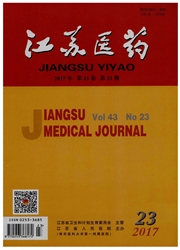

 中文摘要:
中文摘要:
目的研究胸苷酸合成酶(TS)基因5’端非编码区(UTR)多态性与晚期胃癌对氟尿嘧啶(5-FU)化疗敏感性的关系。方法经病理学确诊的晚期胃癌56例,化疗前抽静脉血,提取白细胞DNA,用PCR技术检测TS5'-UTR基因型。所有患者均经5-FU为基础的化疗方案治疗。以实体瘤疗效评定标准和毒性评定标准评价疗效和毒性。结果56例胃癌患者中,TS5'-UTR基因型分2R/2R、2R/3R、3R/3R,基因型频率分别为5.4%、42.8%和51.8%,化疗的总有效率为35.7%。2R/2R和2R/3R基因型组(27例)化疗的有效率为55.6%(15/27),明显高于3R/3R基因型组(29例)的17.2%(5/29)(P〈0.01)。2R/2R和2R/3R基因型组Ⅱ度以上毒副反应的发生率略高于3R/3R基因型组。结论TS基因5'-UTR多态性与晚期胃癌对5-FU为基础的化疗敏感性相关。5f-UTR基因型检测有助于指导晚期胃癌的化疗。
 英文摘要:
英文摘要:
Objective To investigate the relationship between polymorphism in the 5'-UTR of thymidylate synthase gene (TS) and sensitivity of stomach cancer (SC) to fluoropymidine (5-FU) - based chemotherapy. Methods A total of 56 cases with advanced SC were treated with 5-FU-based chemotherapy and DNA of peripheral blood leukocytes was obtained before therapy. TS 5'-UTR genotypes were detected by PCR method. The objective responses and toxicities were evaluated according to RECIST criteria. Results Of all the cases, the frequencies of 5'-UTR 2R/2R, 2R/3R and 3R/3R genotypes were 5.4%, 42. 8% and 51.8%, respectively. The overall response rate to 5-FU- based chemotherapy was 35.7%. The response rate to therapy in patients with TS 2R/2R and 2R/3R genotypes was significantly higher than that in patients with 3R/3R genotype(55.6% vs. 17.2%) (P〈0. 01). The incidence rates of the treatment-related more than Ⅱ grade side effect with the 2R/2R and 2R/3R genotype were slightly higher than that of the 3R/3R genotypes. Conclusion The polymorphism of TS 5'-UTR is associated with clinical response to 5-FU-based chemotherapy, suggesting that TS 5'-UTR genotypes could identify advanced SC patients that would be responsive to 5-FU-based chemotherapy.
 同期刊论文项目
同期刊论文项目
 同项目期刊论文
同项目期刊论文
 期刊信息
期刊信息
